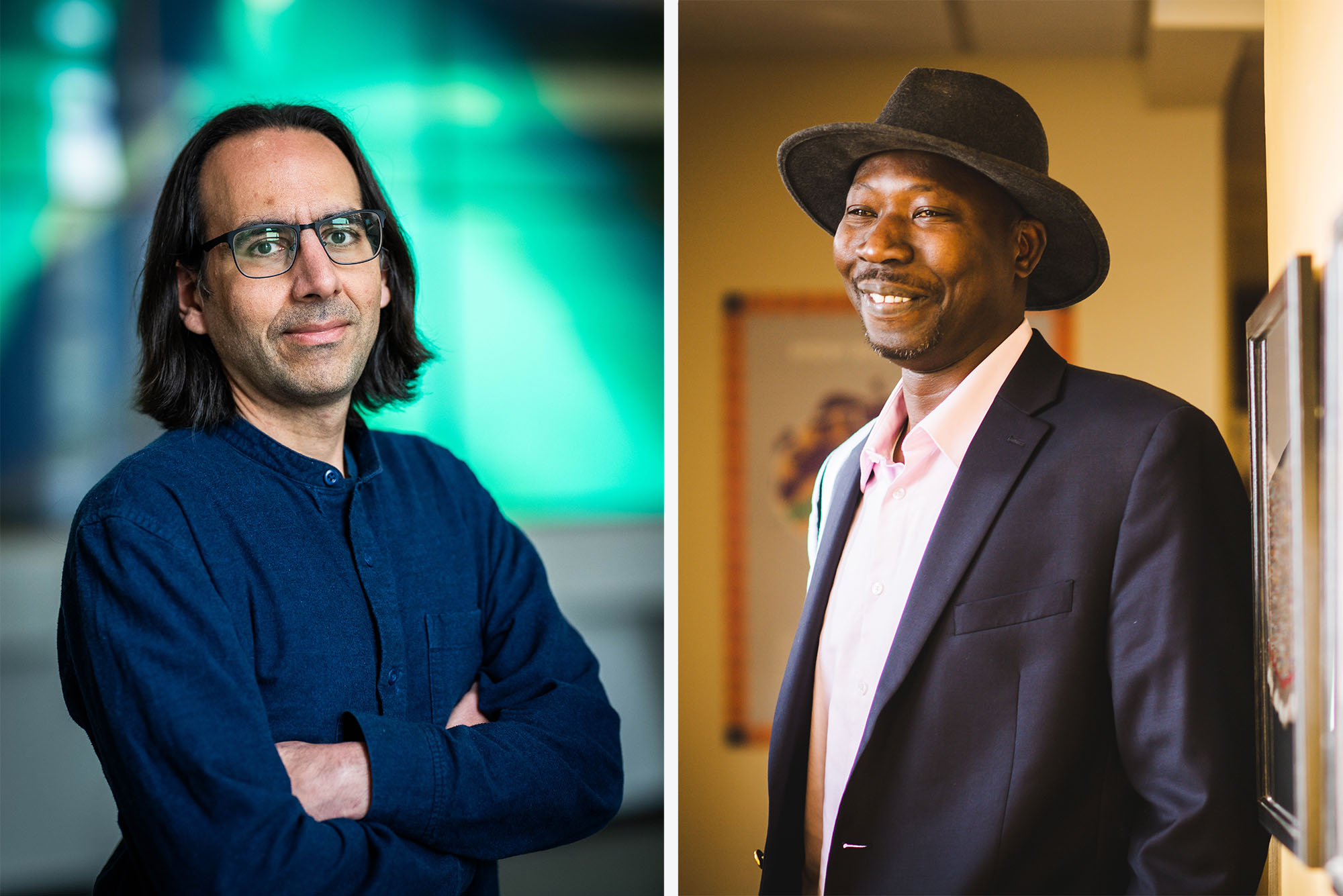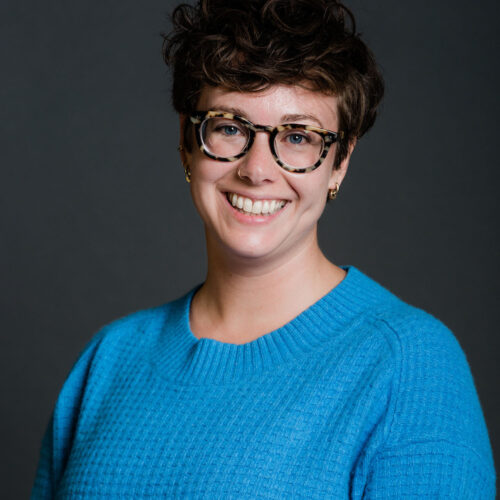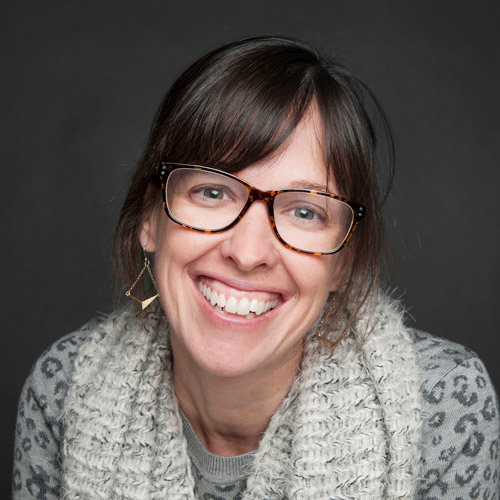Two BU Faculty Honored with Outstanding Teaching Awards

Bobak Nazer (left), an ENG associate professor of electrical and computer engineering, helped to overhaul a complex course that all engineering students are required to take. Fallou Ngom, a CAS professor of anthropology, brings experience as a student to his approach to teaching. Both will be honored at a private dinner on Monday, May 6, for their outstanding teaching accomplishments.
Two BU Faculty Honored with Outstanding Teaching Awards
ENG’s Bobak Nazer to receive Gitner Family Award for Innovation in Teaching with Technology, CAS’ Fallou Ngom named Provost’s Scholar-Teacher of the Year
Two major disruptions in the last decade completely reshaped Bobak Nazer’s approach to teaching Probability, Statistics, and Data Science for Engineers, a required course for all Boston University engineering students. The first came in winter 2015, when storm after storm dropped more than 100 inches of snow in Boston and shut down the city for weeks—a season now affectionately known as “snowmaggedon.” The second is more recent: the COVID-19 pandemic, which uprooted life as we knew it, including teaching and learning.
In both cases, says Nazer, “I knew I had to create a resource for my students to learn, wherever they were, with whatever time they actually had.”
Not only that, but Nazer, a College of Engineering associate professor of electrical and computer engineering and associate department chair for undergraduate programs, also had to wrangle into discernible shape a course that had historically been taught by half a dozen different faculty members at the same time, in as many different ways. Students in one section of the course often ended up with vastly different experiences (and outcomes) as students in a different section.
So, it wasn’t an easy task. The material can also be challenging to grasp and difficult to connect to real-world applications. But Nazer found a solution. He recorded close to 50 short videos that broke down these complex concepts with animated versions of whiteboard notes. He narrated over those videos to explain each lesson. Students watch them before class, and get to spend the lecture period expanding upon what they learned with games and activities, rather than listening to someone lecture. This way, the time spent together in class reinforces and broadens what they’ve already learned, Nazer says. The videos also give students a chance to pause and rewind during lessons that prove tricky to absorb.
They’ve been a big hit. And in the process, Nazer completely overhauled a course that was in real need of a facelift. He worked with other faculty teaching the course to align their course materials and to utilize the same “flipped” classroom schedule (lectures at home, activities in class) he used, with the help of a rich repository of resources he shared with his colleagues.
The videos have been so transformational that Nazer is being honored with the 2024 Gerald and Deanne Gitner Family Award for Innovation in Teaching with Technology. The award recognizes the faculty member or team that best exemplifies innovation in teaching by use, development, or adaptation of technology. It celebrates innovation that results in positive learning outcomes for undergraduate students and that is recognized or adopted by faculty colleagues within or outside BU. The award comes with a $10,000 stipend.
“Every year, I get a few emails from students who mention the videos specifically and how much they appreciated them,” Nazer says.
One student, in an anonymous class evaluation that was included with Nazer’s nomination materials, described the videos as amazing, and also wrote, “The way [Nazer] explains the content makes it incredibly easy to understand and implement.”
Nazer will be celebrated at a private dinner on Monday, May 6. At the same time, the Office of the Provost (which selects the Gitner Award winner) will honor another innovative teacher at the University.
This year’s Provost’s Scholar-Teacher of the Year Award—an honor that recognizes scholars who excel as teachers inside and outside the classroom and who contribute to the art and science of teaching and learning—goes to Fallou Ngom, a College of Arts & Sciences anthropology professor whose research has helped to uncover an ancient writing system used by communities in West Africa.
“It’s a huge honor,” Ngom says of the award. “To know that it was driven by my students makes it even more special.”
Ngom says he always tries to connect the material back to concepts that reflect his students’ backgrounds and interests. So, for example, in one of his first classes after joining BU, he was charged with teaching sociolinguistics—a heady subject that examines the effects of social forces on a region’s language. It’s a topic that can be easily obscured by theories and abstract concepts.
The course materials relied heavily upon European languages (Dutch, French, Portuguese), which seemed out of place to Ngom in a classroom full of people who studied and spoke various African languages. Instead, he organized his students into six language groups, such as Wolof or Mandinka. Each week, the students examined the data—in the form of languages—for each group, applying the sociolinguistic theories that once seemed so esoteric to concrete examples from the languages that were familiar.
In an anonymous end-of-semester survey included in Ngom’s nomination materials, one of his students describes the impact of his teaching: “Professor Ngom does an amazing job of engaging each of us. I feel like he’s changed my potential future because I loved this course and his ideas so much. I’ve learned so much and I think I want to go to grad school for sociolinguistics or linguistic analysis.”
For Ngom, teaching is a way of connecting with his students, offering them the same belief in their potential that he received from one of his mentors as an undergraduate at the University Gaston Berger of Saint-Louis in Senegal.
There, Professor Maweya Mbaya expected a lot of his students, Ngom recalls, an expectation that proved to him how much Mbaya wanted him—and his classmates—to succeed.
“I come from a very modest family. I was the first one to graduate from college, to even attend college. My dad was a tailor. And so I needed someone to grab my hand and pull me,” Ngom says. It was Mbaya who pulled him up.
“That’s stayed with me for all my life. And so the way I treat all my students is as if they are just another Fallou, 20 or 30 years ago. If I was able to make it, they can make it, too.”


Comments & Discussion
Boston University moderates comments to facilitate an informed, substantive, civil conversation. Abusive, profane, self-promotional, misleading, incoherent or off-topic comments will be rejected. Moderators are staffed during regular business hours (EST) and can only accept comments written in English. Statistics or facts must include a citation or a link to the citation.